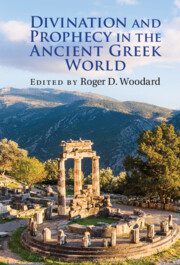Book contents
- Divination and Prophecy in the Ancient Greek World
- Divination and Prophecy in the Ancient Greek World
- Copyright page
- Contents
- Contributors
- Acknowledgments
- Abbreviations
- General Introduction
- 1 Greek Divination as the Transformation of an Indo-European Process
- 2 On Divinatory Practices and la raison des signes in Classical Greece
- 3 Oracle and Client
- 4 Oracular Failure in Ancient Greek Culture
- 5 The Dynamism of Mouvance in the Pronouncements of the Delphic Oracle
- 6 Decentralising Delphi: Predictive Oracles, Local Knowledge and Social Memory
- 7 Oracular Tales before Historiography
- 8 Omens and Portents Foretelling Victory and Defeat: Ontological, Literary, and Cognitive Perspectives
- 9 The Use of Divination by Macedonian Kings
- 10 False Prophets and Fake Prophecies in Lucian
- 11 Afterword
- Bibliography
- Index
11 - Afterword
Published online by Cambridge University Press: 22 December 2022
- Divination and Prophecy in the Ancient Greek World
- Divination and Prophecy in the Ancient Greek World
- Copyright page
- Contents
- Contributors
- Acknowledgments
- Abbreviations
- General Introduction
- 1 Greek Divination as the Transformation of an Indo-European Process
- 2 On Divinatory Practices and la raison des signes in Classical Greece
- 3 Oracle and Client
- 4 Oracular Failure in Ancient Greek Culture
- 5 The Dynamism of Mouvance in the Pronouncements of the Delphic Oracle
- 6 Decentralising Delphi: Predictive Oracles, Local Knowledge and Social Memory
- 7 Oracular Tales before Historiography
- 8 Omens and Portents Foretelling Victory and Defeat: Ontological, Literary, and Cognitive Perspectives
- 9 The Use of Divination by Macedonian Kings
- 10 False Prophets and Fake Prophecies in Lucian
- 11 Afterword
- Bibliography
- Index
Summary
The papers in this volume offer a variety of perspectives on divinatory phenomena attested among ancient Greeks and do so across an appreciable span of time – from earliest Greek oracular notions evolved from pre-Greek sacrificial cult concepts to Greek narratives emanating from Roman imperial times. At the later end of the temporal continuum, Lucian is made especially conspicuous by Fields’ treatment of the satirist in her concluding chapter, but cumulatively Pausanias could hardly be judged to be inconspicuous in the volume, nor could Plutarch, the Delphic priest. But despite the thematic and chronological range of the contributions, there are commonalities and similarities that run throughout. Herodotus, for example, does not fail to make at least one appearance in every chapter and occupies a central position in the expositions of Chapters 3–7. In that core set of Herodotean chapters, however, the historian often provides a literary vehicle for rehearsal and consideration of matters of orality and of poetics relevant to divination pointing us back toward the earlier end of the temporal continuum on display within this work.
- Type
- Chapter
- Information
- Divination and Prophecy in the Ancient Greek World , pp. 261 - 281Publisher: Cambridge University PressPrint publication year: 2023

